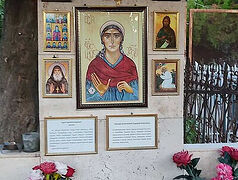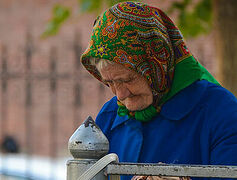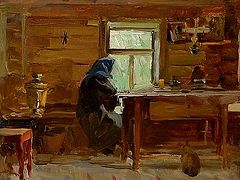A genius, a stunning actor, a Russian Orthodox man—Peter Mamonov has died.
His transformation in life and art was a revelation for many. When we watched the terrifying grimaces and antics of the rock group Zvuki Mu and its soloist Mamonov on the show Musical Ring in the mid-1980s, it felt like he was going to throw up all over himself, it was so hideous—it was impossible to imagine that years later, we would start attentively listening to the wise reflections of this amazing man who would begin to live an intense spiritual life.
“If only I could have time! If only I could have time to prepare!” he exclaimed, in anticipation of the Judgment.
He was an icon of Russian rock for many years, traversing, as we now realize, an apophatic path: grimacing (the devil is the ape of God!), alcohol, drugs, revelry. Therefore, Mamonov’s deep immersion into Christianity, Orthodoxy, was a shock for all.
I remember how one of the Kiev television stations enthusiastically announced a conversation with Mamonov in November 2004, and the host breathily asked her guest: “How do you like our orange revolution?” Expecting delight from this underground cult figure, she was nearly paralyzed when she heard: “Your revolution is junk!” Then what has value, the woman asked, coming to herself. And the laconic answer she heard was, “Orthodoxy.”
He stunned the audience in Pavel Lungin’s films— “Taxi Blues”, “Tsar”, and especially, of course, “The Island” (Ostrov).
Of “Taxi Blues” (1990), with Mamonov in the lead role, some still say, “If there’s an explicitly anti-Russian film, then that’s it.” Others believe it’s an anti-soviet film, in the genre of “perestroika black humor,” which there was a lot of at that time. Still others see in the plot only the eternal conflict of the artist with darkness, about which Pushkin wrote. Mamonov played the saxophonist Alexei Seliverstov very vividly, but in his original, pre-Orthodox life.
In “Tsar” (2009), as Mamonov said, he played a cyclically inconsistent sinful man endowed with great power—not strictly Ivan the Terrible.
Mamonov sought himself and his path to God in a difficult and contradictory way, and, in general, he found it. He went from Zvuki Mu[1] to words about the eternal, about God. At forty-five, by his own admission, he realized that he was in the darkness of despair, and for twenty years had faded away into alcohol addiction, struggling with demons.
People were amazed not only by his undoubted and diverse talents, but also by how he fought for his soul.
For me, the Lord is the constant joy of His presence. That’s how I want to live; it’s so good—strong, close… And if I’m in sin, then I immediately feel that I’m alone, that this day has passed me by. It’s very simple: With God is life; without God is death.
He also said:
I lay down in a coffin in “The Island.” It’s an austere thing. Four walls and a lid—no Gospel, no icons, nothing. What will we lie down with? What have I gathered? I know how to record, I can drive a car, I know how to use certain things. But I don’t know how to forgive, how not to get annoyed, how to give without regretting it. Everything that will be useful in eternity, everything that I can’t touch—I don’t know how. But I’ve learned a thousand unnecessary things during this life.
What to do? Peel myself off slowly. Like a band-aid from a wound, tear it off slowly. The Lord gave me a big house. I like it—I have a bedroom, and an office, but I’ll have to leave all this. What a pity! 4,000 selected vinyl records—what a pity! And then I see that it’s not such a pity over time. I’m glad to see the beginnings of detachment in myself. This is what we should spend our life doing—preparing for eternity.
The confidence and universality of Mamonov’s tone is such that we realize we’ve lost a loved one.
Mamonov led many people to God with his role as Elder Anatoly in “The Island” (2006). You can only throw up your hands and marvel, like Patriarch Alexei II, who exclaimed in a talk with Pavel Lungin: “What a film you managed to shoot!”
Mamonov didn’t just play a role in “The Island,” but lived and prayed. He didn’t just die in the film according to the script—he died as a repenting sinner. People watched it and mourned their sins, seeing the power of repentance and joy of communion with the Lord. It was painfully clear: It was a soul crying out—Peter Mamonov was entreating the Lord for forgiveness of sins not only for the hero of the script, but for himself at the same time; and for us, for us, for us!
It’s impossible not to agree with the idea that Fr. Anatoly received from God the gifts of clairvoyance and wonderworking, and Peter Mamonov received the gift of persuasion, the gift of true preaching. Whether deliberately or not, Lungin chose for this role not an ideal actor, but a sincerely believing and repenting man. This wasn’t just a director hitting the target—it was the providence of God.
Peter Mamonov taught us with a simple word, understandable to everyone. The segments of his own life—these are his parables. He spoke in such a way that he pierced through our thick skin and fossilization. It was, in fact, theology and preaching, and with his sincerity, Mamonov drew many thousands of souls to himself and to the faith. May God grant us to hearken to much of what he had to say!
It’s interesting what awe, delight, and adoration TV hosts watched Peter Nikolaevich with—Daria Spiridonova in the White Studio and Ksenia Sobchak[2] in Dok-Tok. And the conversation with the latter, dedicated to the artist’s seventieth birthday, certainly wasn’t harmonious from the get-go, and it was gratifying to see how the guest humbled the unhumble with his preaching, and the show ended benevolently.
His inner growth was reflected in a wonderful book of miniatures and aphorisms, with the indicative, “childish” title, Squiggles. He was probably the only one who could find such an exact title and write such a book. There were several volumes of his Squiggles.
They’re not journal entries, nor are they full-fledged prose poems, nor excerpts from a notebook—they’re really squiggles/flourishes, written, drawn by a hand not quite obedient yet, unable to draw the familiar lines, but reproducing the inner world of a man who perceives the world in a childlike way—as a Christian.
Some notes reveal Mamonov as a poet:
Heaven. I look out the window. Before me lies a pile of yellow leaves, fallen from a cherry tree, somehow reflecting the entire firmament.
Or a poet-philosopher:
The willow tree by the river is large, bent, and old. The trunk is knotty, full of veins and black hollows. The trunk is surrounded by a mesh nimbus of branches, sprigs, and very tiny twigs and leaves. Like a life full of bustling, not always necessary movements. Sometimes: very important—a large branch and good, juicy leaves. Everything is connected by death. This trunk. It has already died, raised a green life. The lower part grows into the ground. I don’t see the roots, but I know of them; they are nourished with juice and will never stop, because God feeds them. I look upon the willow tree and already fear death less; I start not to evaluate life so highly. As the willow tree gazes, the whole tree, into the smoothly and rapidly flowing river, so I am increasingly interested in infinity and Heaven.
Struggling with his own irascibility, Mamonov wrote:
Once everything was going wrong for me. I come home, and there’s some new shaggy cat my wife let in. And I think, what an idiot— we’ve got nine people here, and she’s bringing more home. The cat jumped up on the table. It’s too much! I smack it. I immediately feel bad. I bend down to pet it—skin and bones; probably the summer folk threw him out. It was famished. I nearly cried.
Abba Ammon said: “I spent fourteen years in a skete, praying to God day and night to grant me to overcome my anger.”
Let’s read Peter Mamonov more carefully.
***
I can do everything: saw, whittle, chop. A man should do all this, not lift weights in a fitness club. Oh, some complain that there’s no work. Learn how to lay tiles and you’ll be driving a Mercedes. I’ve built an entire city on my plot of land, with a sauna and a barn. But if you lie around on the couch eating cantaloupe, it’ll turn out bad for you. Alcohol, drugs. Unfortunately, there’re many such men now…
***
When people come visit me, they say: “You live so far away.” And I ask: “Far away from what?” And they have nothing to say. Because I live in a village, every day is different for me. Every day a different sky. I get up in the morning—and off I go, and in the evening you look and see: What clouds and all that the Lord has given us. Good Lord!
***
You stand and look at these stars like a madman, and you think: “My God, tomorrow I will die, and what will I say to Him?” As the prayer says: “If your shadow is so beautiful, what must You Yourself be like?” One time as I went inside, I thought I’d go turn on the computer, but there was no electricity.
And I found myself in complete darkness. Lie down sometime in the darkness, turn off all the gadgets, and ask yourself the question: Who are you and how do you live? Am I generally a good guy, or so-so?
***
People have one path: We will all depart this life. Yesterday I was twenty years old running along Gorky Street, and tomorrow I will die. No allegories. Am I afraid? I am. After all, this is unknown for me. But very interesting! The Lord is there, Eternity. I’m not ready.
***
Pushkin replied to us: “I leaf through my life with disgust, but I cannot erase the shameful lines.” My answer is the same as his. Once I was sitting with Vanya Okhlobystin on the set of the film Tsar, having our makeup done and talking about who read and heard what about eternal life. The makeup artist says: “You guys are so funny!” And I say: “And when we appear before the Creator, you’ll be splitting your side with laughter.” After all, we’ll have to look into the eyes of God, Who gave His life for us on the Cross, with our varied consciences and our varied lives.
***
We don’t have to deceive ourselves that after death there awaits us nothing but dust. All major scholars are believers. All the doctors I know, who work with life and death, are believers.
There are thousands of testimonies about clinical death, proving that there is no end. Einstein didn’t doubt the existence of God, nor did Pushkin, nor Lomonosov, nor Mendeleev. And some seventeen-year-old Lenochka declares: “I doubt your God exists...” Read first, study the issue, then talk. It’s like you go into the metro and look at the map—a ring, various colored dots. You throw up your hands: “Ridiculous. I’ll figure it out myself.” So you ride the ring your whole life. God doesn’t care about our actions; He needs a motive: Why do we do this? Why do we live?
***
The death of a sinner is evil. In that terrible state in which you die and stiffen, that’s how you’ll go into eternity. There is no change there, because there is no will, no body. The body is our will to change.
***
I had to lay in a coffin on the set of the Island. Three times I jumped out of it—I couldn’t stand it. It’s an austere thing—a coffin. You lie there, narrow walls—and nothing else. Not even a Gospel to read. Whatever you’ve gathered in your soul, that’s what you’re lying there with. The things we take into eternity can’t be touched—what we’ve conceded, forgiven, given away. It is more blessed to give than to receive.
***
Do you want a Ferrari? Acquire the Holy Spirit and you’ll see that you no longer want a Ferrari. Because any man, according to St. Seraphim of Sarov, would agree to be gnawed by worms for a thousand years for but one moment of life in the Spirit. I have more faith in St. Seraphim than a car manufacturer in Italy.
***
God’s world. This is an expression we have. What does it mean? For me, it’s God’s world. Everything that reflects His majesty and beauty. Sometimes it’s my soul, sometimes a car, sometimes it’s trees or grass. Or when on a clear September morning the sun and moon are visible together on either side of the sky. Then can we say that God is everywhere? Except for the places we’ve driven Him out of. How awful it is when, for example, you have a bad home, or someone’s cursing.
***
Sometimes you run around all day, you’re busy, talking on the phone—but you don’t actually do anything. And sometimes you pray briefly, but you really try to talk with God from the bottom of your heart. The rest of the time you lay by the river, looking at the water, and you suddenly realize: Today wasn’t spent in vain; I worked hard.”
***
The more you suffer, the stronger your soul becomes, because God wants everyone to be saved and allows them to do what they can. So I’m learning to endure joyfully—the Kingdom is at hand, and eternity awaits. Eternity—not thirty or forty years. That’s nothing!!!
***
Sin. I don’t remember when and where I saw it, but I can still picture a man who, out of jealousy or some other stupid reason, grabbed a knife and plunged it into the chest of his beloved and immediately pulled it back out. Like: “Oh, no, no. I’m sorry. I didn’t mean it.” I was astounded. Whether he wanted to or not, it was too late.
So sin, even small ones, leave an indelible mark on my soul. Everything seems alright: You don’t drink, you don’t smoke, but still—you get up in the morning and you’re sad. Why? Because you’re full of scars. You’ve got almost nothing left to live with, to love with. Only scars. And it gets very scary and somehow aggravating. I did it all with my own hand.
***
How I’m still alive, only God knows. He saved me for some reason, and He gave me faith, and now He holds out hope for me. We’re all that way. A harlot, a publican, a thief.
One wise man said that sin is that which separates us from God. When I have time to ponder: Is this something that separates me now? It works out if you ask God to help you with it.
And then: The innocent always suffer. Because of me. Because of what I did or didn’t do. Because of what’s in my heart: malice or love.
***
How I want to begin to live without fear. It means to take up the cross. To accept everything that happens—both the good and the bad.
***
And such wise, sophisticated quatrains we find among Mamonov’s “squiggles”:
Glory to the Lord God!
I look at the road.
There’s a little of everything there.
Glory to the Lord God![3]
Before his repose, the artist, in serious condition from COVID in the hospital, invited a priest and managed to receive Unction and Communion.
When I die, I don’t need oak coffins and flowers. Pray for me, guys, because I led a very checkered life!
Let us pray. Remember, O Lord, Thy departed servant Peter in the faith and hope of life eternal and forgive him all his transgressions voluntary and involuntary, and grant him the Kingdom of Heaven!
A joyous birth into Life Eternal, dear Peter Nikolaevich!





